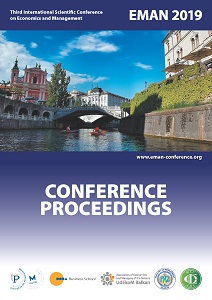POST-TRUTH ERA AND VESTED INTERESTS IN APPROACHING ECONOMY IN FINANCIAL NEWSPAPER HEADLINES AND LEADS. NEWSWORTHINESS QUOTA IN THE CASE OF PROGRESSIVE TAX VERSUS FLAT TAX IN THE ROMANIAN DAILIES ZIARUL FINANCIAR AND FINANCIARUL
POST-TRUTH ERA AND VESTED INTERESTS IN APPROACHING ECONOMY IN FINANCIAL NEWSPAPER HEADLINES AND LEADS. NEWSWORTHINESS QUOTA IN THE CASE OF PROGRESSIVE TAX VERSUS FLAT TAX IN THE ROMANIAN DAILIES ZIARUL FINANCIAR AND FINANCIARUL
Author(s): Aurelia Ana Vasile
Subject(s): Business Economy / Management, Socio-Economic Research
Published by: Udruženje ekonomista i menadžera Balkana
Keywords: post-truth era;vested interests;progressive and flat tax;newspaper headlines and leads;topic (newsworthiness) quota;
Summary/Abstract: Nowadays, in times that Ralph Keyes (2004) called the post-truth era, there is an obvious trend towards embellishing or re-shaping the truth until it gets diluted into what the author of this dilution desires and is interested in. The term vested interests coined by William Crano (1995) may account for the background motivation that may lead towards this widely resorted to distortion of the truth so that it may fit the aims of the distorter. When referring to vested interests, the Cambridge Academic Content Dictionary specifies the existence of interests in influencing others so that some benefits may be obtained or preserved. According to Crano (1995, pp. 131-158), “if the attitude object is subjectively important and the perceived personal consequences are significant, there will be a greater chance the individual’s attitude will be expressed behaviorally”. Such aspects of communication may have strong economic impact, and are therefore crucially significant when they manifest in the main stream media in the field, i.e., in the most important economical publications. Economic vested interests may thus have a great impact and bring about the tampering with the truth, mostly on key topics like fiscal policies. Our content analysis of a research corpus of 210 news stories (that got elicited online starting from the keywords “progressive/flat tax”) in the two Romanian economic dailies that have the largest circulation, Ziarul Financiar (9200 copies), and Financiarul (8500 copies), in the time span 10th January 2008 – 28th February 2019 has revealed intriguing facts. We have selected such a time span because Financiarul published its very first issue on the 10th of January 2008. The keywords “progressive/flat tax” were chosen as the economic stake of such a topic that they refer to is quite high and it consequently may then trigger strong vested interests and the temptation to tamper with the truth. The fair distribution of the tax burden (Peter Diamond, Emmanuel Saez, 2011, p.165), and the model of optimal tax theory and practice arouse significant interest, mostly on the part of large businesses that engender high profit rates. We tackled the news story headlines and leads that contain the mentioned keywords, as such story parts comprise the main point of stories. However, the whole orientation of the stories was taken into account for the gist that is relevant with regard to our research aims to reveal some post-truth communication mechanisms involved in economical gearing towards vested interests, in order to better critically understand and be able to strengthen democracy and economic fairness. According to our findings, in Ziarul Financiar, 28 % of the headlines and leads explicitly tackled the issue, whilst in Financiarul, almost 74 % bluntly referred to the progressive and to the flat tax. There were also clear differences in point of the newsworthiness quota ̶ a term or concept that is aimed to be coined here ̶ allotted by the two dailies to the topic of progressive versus flat tax. Moreover, content specifically, organizations and individuals that appeared in the content of these headlines, leads, and whole stories expressed stances that accounted for vested interests.
Book: EMAN 2019 / 3 – Economics & Management: How to Cope with Disrupted Times - CONFERENCE PROCEEDINGS
- Page Range: 341-352
- Page Count: 12
- Publication Year: 2019
- Language: English
- Content File-PDF

